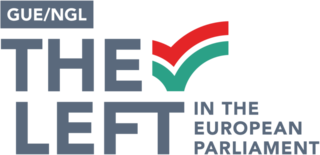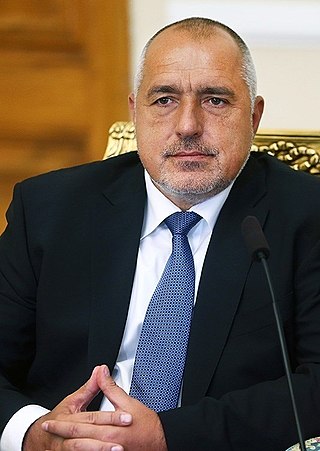
The European Parliament (EP) is one of the legislative bodies of the European Union and one of its seven institutions. Together with the Council of the European Union, it adopts European legislation, following a proposal by the European Commission. The Parliament is composed of 705 members (MEPs). It represents the second-largest democratic electorate in the world, with an electorate of 375 million eligible voters in 2009.

The European People's Party Group is a centre-right political group of the European Parliament consisting of deputies (MEPs) from the member parties of the European People's Party (EPP). Sometimes it also includes independent MEPs and/or deputies from unaffiliated national parties. The EPP Group comprises politicians of Christian-democratic, conservative and liberal-conservative orientation.

The Left in the European Parliament – GUE/NGL is a left-wing political group of the European Parliament established in 1995. Before January 2021, it was named the European United Left/Nordic Green Left.

A member of the European Parliament (MEP) is a person who has been elected to serve as a popular representative in the European Parliament.

Non-Inscrits are Members of the European Parliament (MEP) who do not belong to one of the recognised political groups.

The political groups of the European Parliament are the officially recognised political groups consisting of legislators of aligned ideologies in the European Parliament.

Scotland was a constituency of the European Parliament created in 1999. It elected between eight and six MEPs using the D'Hondt method of party-list proportional representation every five years from 1999 until 2020. The constituency was abolished after the United Kingdom left the European Union on 31 January 2020.

The 2009 European Parliament election in Bulgaria was held on Sunday 7 June 2009 and was the election of the delegation from Bulgaria to the European Parliament. As a result of the Treaty of Nice – that became active in November 2004 – the number of Bulgarian delegates in the European Parliament decreased from 18 to 17 delegates. When the Treaty of Lisbon was ratified, the number of Bulgarian Delegates increased to 18 again, giving a second seat to the Blue Coalition.

The European Conservatives and Reformists (ECR) is a soft Eurosceptic, anti-federalist political group of the European Parliament. The ECR is the parliamentary group of the European Conservatives and Reformists Party European political party (formerly known as the Alliance of Conservatives and Reformists in Europe or Alliance of European Conservatives and Reformists, but also includes MEPs from four other European parties and thirteen MEPs without European party affiliation.

The 2014 European Parliament election was the United Kingdom's component of the 2014 European Parliament election, held on Thursday 22 May 2014, coinciding with the 2014 local elections in England and Northern Ireland. In total, 73 Members of the European Parliament were elected from the United Kingdom using proportional representation. England, Scotland and Wales use a closed-list party list system of PR, while Northern Ireland used the single transferable vote (STV).

The Progressive Alliance of Socialists and Democrats (S&D) is the political group in the European Parliament of the Party of European Socialists (PES). The Progressive Alliance of Socialists and Democrats was officially founded as a Socialist Group on 29 June 1953 which makes it the second oldest political group in the European Parliament after Renew Europe (Renew). It adopted its present-day name on 23 June 2009. Centre-left in orientation, the group mostly comprises social-democratic parties and is affiliated with the Progressive Alliance and Socialist International.

The 2014 European Parliament election in Bulgaria was held on 25 May 2014 to elect the Members of the European Parliament from Bulgaria to the European Parliament as part of the larger European Parliament election. After a decision by the European Council in 2013, Bulgaria was allocated 17 seats in the European Parliament for the Eighth European Parliament.
An election of the delegation from Latvia to the European Parliament was held on 24 May 2014.

The ninth European Parliament was elected in the 2019 elections and is to last until the 2024 elections.

Renew Europe (Renew) is a liberal, pro-European political group of the European Parliament founded for the ninth European Parliament term. The group is the successor to the Alliance of Liberals and Democrats for Europe (ALDE) group which existed during the sixth, seventh and eighth terms from 2004 to 2019. Renew Europe in the European Committee of the Regions is the sister group of Renew Europe.
Identity and Democracy is a right-wing to far-right political group of the European Parliament, launched on 13 June 2019 for the Ninth European Parliament term. It is composed of nationalist, right-wing populist and eurosceptic national parties from ten European nations. It is the successor to the Europe of Nations and Freedom group formed during the eighth term.
This page is based on this
Wikipedia article Text is available under the
CC BY-SA 4.0 license; additional terms may apply.
Images, videos and audio are available under their respective licenses.











